I’m taking a couple of weeks off. This Post and last week’s are reprints (with some revision) from August 2019 – as we prepare for the celebration of the Dormition of the Theotokos on August 15.
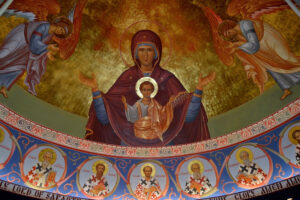
Last week we saw how often the Virgin Mary is mentioned in the New Testament, second only to her Son, and how the Church’s titles for her all derive from the Scriptures. (If you missed it, please go back and read it. Always begin things at the beginning.)
We stopped in the middle this section:
What the Bible teaches about Mary
5 Does the New Testament tell us that Mary is the Mother of Christians, the Mother of the Church? Yes. There is, of course, no distinction between the titles, since the Church is the Holy People of God.
Let’s spend some time on this one.
First, the theology. In the New Testament, the Church is the “Body of Christ”, the place of his bodily Presence in the world – as is the Holy Eucharist, but that’s another story. As Paul 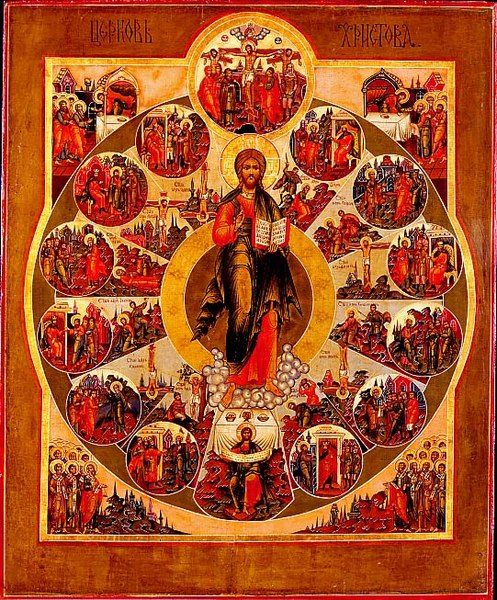 put it, Christ is the Head, and we are the members of His Body. 1 Corinthians 12:27 – united with Him just as hands and arms are part of the human body. Now, Christ is God. He has never been limited to the Divine-Human Being who dwelt on earth – neither before His Incarnation nor after His Ascension. In His Person He now incorporates all who are joined to Him into a “multi-personal bodily Person”. (Is that a safe way of expressing the Mystery? In any event, do not try to visualize this. We can’t do it.) The point is that, since Mary gave birth to Christ bodily and is His Mother, it follows that she is necessarily also Mother of His Body the Church. She is our Mother, too.
put it, Christ is the Head, and we are the members of His Body. 1 Corinthians 12:27 – united with Him just as hands and arms are part of the human body. Now, Christ is God. He has never been limited to the Divine-Human Being who dwelt on earth – neither before His Incarnation nor after His Ascension. In His Person He now incorporates all who are joined to Him into a “multi-personal bodily Person”. (Is that a safe way of expressing the Mystery? In any event, do not try to visualize this. We can’t do it.) The point is that, since Mary gave birth to Christ bodily and is His Mother, it follows that she is necessarily also Mother of His Body the Church. She is our Mother, too.
Let’s come at it in another more “human” way, and look at a sometimes misunderstood passage.
“While Jesus was still talking to the crowd, His mother and brothers stood outside, wanting to speak to Him. Someone told Him, ‘Your mother and brothers are standing outside, wanting to speak to you.’ He replied, ‘Who is my mother, and who are my brothers?’ Pointing to His disciples, He said, ‘Here are my mother and my brothers. For whoever does the will of my Father in heaven is my brother and 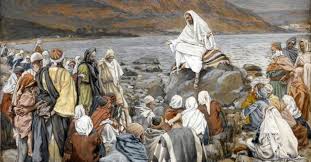 sister and mother.’” Matthew 12:46-50 (We’ll say more about that in a minute.) From the Cross, He will provide His Mother with a new “son” John, to care for her after His death. He loved her. And especially in this instance when she came worrying, as all loving mothers would, to make sure her Son was looking after himself, how could He help but love her? He could not have been rejecting her. There must be another “angle” on this.
sister and mother.’” Matthew 12:46-50 (We’ll say more about that in a minute.) From the Cross, He will provide His Mother with a new “son” John, to care for her after His death. He loved her. And especially in this instance when she came worrying, as all loving mothers would, to make sure her Son was looking after himself, how could He help but love her? He could not have been rejecting her. There must be another “angle” on this.
There is. Here Jesus was honoring His Mother, for who had completely obeyed and kept the will of God? She had. She had said to the Archangel, “Let it be to me according to your word”. So now Christ was expanding His family (and hers) from a natural family into a “super-natural” Family. People would become members of His Family, not by the water of the womb and physical birth, but by the water of Baptism and a new spiritual birth into a life of doing the will of His Father – just as she already had.
Does this in any way detract from our love of God? our love for Jesus? Of course not. People, get rational! Think! Does your love for your own natural mother come between you and God? Then why ever should our love for our Mother Mary do that?
Oh, yes, a side issue, just in case you’ve wondered: How can Mary (and the saints) find time to care for all of us? It’s because they’re in Heaven, beyond our world, where they are not limited by our time, where they have “all the time in the world” at the same time.
6 Does the Bible teach that Mary is our Advocate with her Son? Yes. At the Wedding in Cana of Galilee she “advocated” (interceded, if you will) with her Son on behalf of a family friend. If she did it then, why would she have stopped now? Certainly she doesn’t talk Him into something He does not will to do, contrary to the will of His Father. But 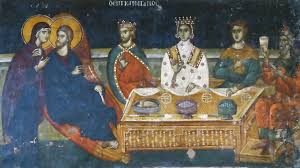 at Cana she helped Him to see what His will really was. He was hesitating. I’d guess He wanted to do something more significant for His first Sign, rather than “waste” it making wine for a wedding party..
at Cana she helped Him to see what His will really was. He was hesitating. I’d guess He wanted to do something more significant for His first Sign, rather than “waste” it making wine for a wedding party..
It was our son David’s godmother who helped me understand this, just as Mary helped Jesus to see. This was an act of pure, unselfish, humble kindness, done quietly without calling attention to Himself, just to save a family friend from embarrassment. That was no “waste”. It was the love of our Self-effacing God in action, showing us how to do the same.
So why should their relationship have changed now? In this regard, I’m thinking things in Heaven are not so very different from those on earth – including the relationship of Mary and Jesus. I think we tend to “over-spiritualize” (disembody?) Heaven. We don’t know the “ins and outs” of that blessed Country. But we do know that Jesus Christ rose bodily and ascended bodily. He is still a human being, a Man – the Scriptures and the Fourth Ecumenical Council made that clear. And His Mother is still His Mother. I suspect she still whispers into His ear from time to time.
7 Do the Scriptures teach that Mary has been glorified in Heaven? Many people would say No. The answer is: Yes!
August 15 is the day when both Orthodox and Roman Catholics celebrate the great feast of Mary’s death and and 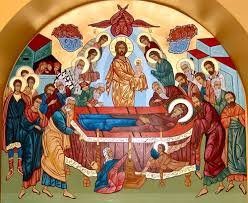 entrance into heaven. However, we each take a slightly different approach concerning precisely what happened then.
entrance into heaven. However, we each take a slightly different approach concerning precisely what happened then.
English-speaking Orthodox usually title the day “The Dormition of the Theotokos”. * “Dormition” is Latin for “Falling Asleep”, making the point that in death she simply “fell asleep” with her Son on this side and “woke up” with Him on the other – as do all who die in Christ. Our Orthodox icon shows Christ receiving her pure soul, symbolized by a new-born baby – her “birth” into Heaven.
- How odd that in the title we combine a distinctly Latin word with a distinctly Greek one. Greeks more consistently title it “Kimissis” / Κοίμησις Θεοτόκου.
Roman Catholics call the day “The Assumption”. They have a dogma (promulgated not until 1950! but believed by many much earlier) that she was taken bodily (assumed) into heaven, like her Son. Probably most Orthodox believe this as well – I do, on the evidence *1) – but we have no formal teaching about it. After thirty years of searching I have found not one Orthodox hymn or text that clearly refers to her bodily Assumption. *2)
- 1) For one thing, where are her relics? There aren’t any. There are relics of many of the earliest saints, but from the beginning no one has ever claimed to have any relics of the Virgin.
- 2) Wednesday August 17, 2022: After all these years, I just found one. Wednesday after Dormition, Hymn after first Kathisma (chanting of Psalms): “your precious body has passed over to paradise”.
O Theotokos, in giving birth you have been preserved in virginity and in your falling asleep, you have not forsaken the world. For while living you were translated, being the Mother of Life. Wherefore by your pleading, deliver our souls from death. (sung in Greek, Romanian, Arabic, Church-slavonic, English and Spanish)
Roman Catholics and Orthodox agree that the Mother of God has now been glorified in heaven. Here is the Scriptural evidence for it:
John the Apostle in his Revelation/Apocalypse wrote about it: “Now a great sign appeared in heaven, a Woman clothed with the sun, with the moon under her feet and on her head a garland of twelve stars… She bore a male Child who was to rule all nations with a rod of iron”. Revelation 12
Some say the Woman in the vision is Judaism which gave birth to the Messiah, so to speak, with the twelve stars representing the twelve tribes of Israel. Perhaps. Some say she is the Church which now brings Christ into the world. I think that is true, for she is adorned by the Twelve Apostles.
But surely John not chiefly have meant Mary, the Woman who literally gave birth to the One who rules the world? Mary, his adopted Mother, and he her adopted son – whom he looked after for the rest of her life. She must have been on his mind almost continually. At the beginning of his Revelation, John had seen Jesus Christ radiant in His own heavenly light. Revelation 1:9-18 Now he sees Mary clothed with the light of her Son, Mary now “deified” – this humble girl from a little village of Galilee!
The Virgin Mary has been glorified in Heaven. This surely is the meaning of this passage – and it’s startling how many non-Orthodox, non-Roman Catholic commentaries studiously miss it!
8 We sing that the Mother of God is “more honorable than the cherubim, and more glorious beyond compare than the seraphim”. Is that Scriptural? Yes.
Choir of Saint John of San Francisco Monastery, Manton, California
 9 Has the Orthodox Church turned Mary into a mother goddess? No, but God has! She has already become what we all may be. But she has no glory, no power apart from her Son. Have you noticed: Orthodox icons almost never portray her alone. Almost always she is shown her with her Son. Even sitting enthroned, she holds Him who is her Lord and God, and He is the one who is blessing us.
9 Has the Orthodox Church turned Mary into a mother goddess? No, but God has! She has already become what we all may be. But she has no glory, no power apart from her Son. Have you noticed: Orthodox icons almost never portray her alone. Almost always she is shown her with her Son. Even sitting enthroned, she holds Him who is her Lord and God, and He is the one who is blessing us.Why do we Orthodox honor the Mother of God? Because the Bible says so!
Now, for any here present who are still in process:
In this article I have tried to stick pretty closely to the New Testament, its words and its implications. To us Orthodox, the Holy Scriptures are the door which has opened the way to our love of Mary, the signpost which has pointed us to her, and also the rule which has kept our devotion to the Virgin Mary in order.
However, the Bible naturally says nothing about the Theotokos in centuries which followed: Her miraculous protection and love shown to people![]() , her numerous weeping icons, her occasional appearances. And a lot more.
, her numerous weeping icons, her occasional appearances. And a lot more.
All these came with time, in ways both great and small.
For one example, this is her weeping icon at Saint George Antiochian Orthodox Church, Cicero, Illinois – one of many in the Church. See: https://frbillsorthodoxblog.com/2018/08/17/79-weeping-icons-get-serious/
For a lesser example: the time when a rather “fussy” bishop was visiting our Saint Nicholas Church. Deacon John and I were both extremely nervous, but as we stood before the icon of the Theotokos on our icon screen during our preparatory prayers, we each independently felt a coolness, a calm, a peace pour forth almost palpably from her, and after that we were at ease. After Liturgy we were amazed to find that we had both had the same experience.
And here is a story which shows how integral the Mother of God is to Orthodox life, her presence almost taken for granted. (Note: In Greek custom, she is often called the “Panaghia” / “all holy”. *) This happened to the grandmother of a man in our church. When she was a little girl, she woke in the middle of the night to see a woman in light standing at the foot of her bed. (This may or may not have been just a dream.) She ran to her mother, terrified. Her mother’s response: “Oh, that’s just the Panaghia. She won’t hurt you. Go back to sleep.”
- from the text: “Commemorating our all holy, pure, blessed, and glorious Lady, the Theotokos…”
Let me stress this: Of course, we honor and obey God first, Father, Son and Holy Spirit. He is the source of all things. None of the saints, beginning with Mary, would think of doing anything to get in the way of God. That’s why they are saints. Their work on earth and in Heaven is this only: to lead us to God, to Jesus Christ, their Lord and God and Savior, and ours.
But let’s have none of this “me and Jesus” religion, or even “me and God”. If you marry someone, you get the whole family. If you become a Child of God, you get the whole Family, in Heaven and on earth, including His Mother and ours.
Conclusion
So if any of you have read the Bible and have missed Blessed Mary, please read again. It is sad beyond words that so many Christians today are “without” their Mother Mary and her love. But actually they’re not. Like all good mothers, she never stops loving her children – even those who have forgotten her.
Mary our Mother, Mary full of grace.
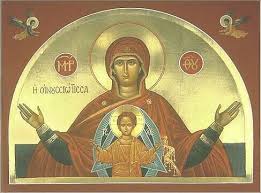
Next Week: As I enter my 85th year…
Week after next: Another personal Post – My Final Trip to Greece, and Saint Phanourios
How can you not be moved by the Megalynarion chanted in Arabic ~ such a beautiful language for chant! I do not speak it, but it can be felt…..
As a previous protestant, it took me awhile to “come around” to the Theotokos. Now I can’t imagine not asking her for help.